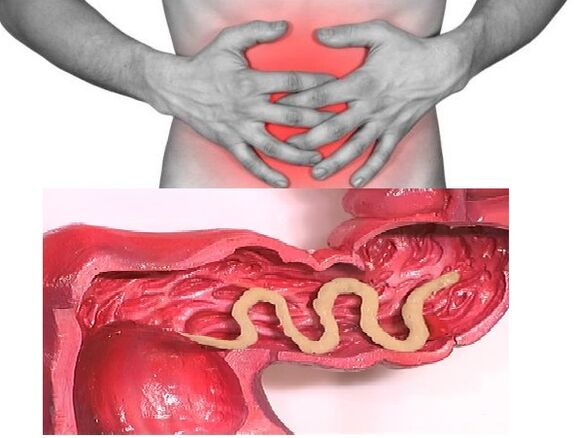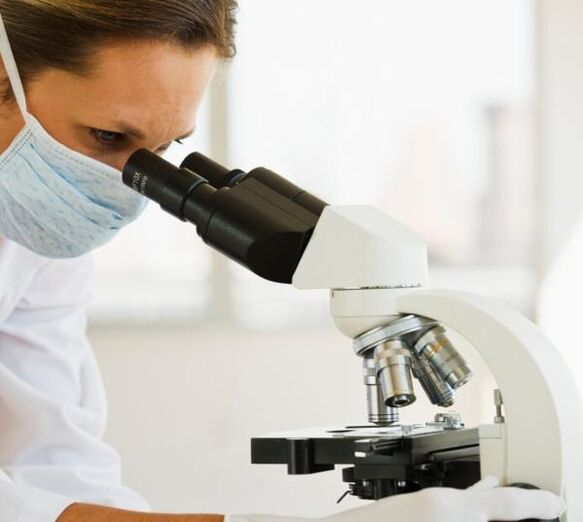Many people don't even think that there are parasites in their bodies. Moreover, people often don't even suspect that if they have health problems, the culprit in this situation is the microorganisms that exist at the expense of the owner.
At the same time, helminths can cause various helminthiases (ascariasis, pinworm disease, echinococcosis, trichinosis, etc. ). Without deworming, a person will have many complications.
Therefore, in the case of childhood worm invasion without treatment, there may be delays in physical and mental development. The organs affected by the worm can cause inflammation, and the inflammation will not disappear even after the parasite is removed.
But how to tell if there are parasites in the house? What are the symptoms and diseases associated with different types of helminthiasis?
In order to identify worms in humans, what should you look for

Rough skin, spots, acne, baldness and premature wrinkles-all these manifestations may indicate the presence of parasitic microorganisms. In addition, nail problems or the formation of cracks in the heel (damage to the digestive organs) may indicate helminthiasis, and sometimes there may be a link between psoriasis and Lamb's disease.
Usually the above symptoms are caused by Lamblia or Trichomonas. However, any worm invasion will have a negative impact on immunity.
In turn, this leads to the following signs:
- Sinusitis;
- Angina pectoris;
- polyp;
- Inflammation of the sinuses;
- Snoring suddenly.
To identify parasites in men, you need to pay attention to whether there are adenomas, cystitis, impotence, prostatitis, stones and sand in the kidneys and bladder. Some worms affect the brain and affect the development of future offspring.
To find out which parasites a woman has, the following symptoms can help:
- Fibroids;
- Pain during menstruation;
- Fibroma;
- Interruption of the menstrual cycle;
- Bladder and kidney dysfunction;
- Fibrocystic breast disease;
- Inflammation of the ovaries.
For appendicitis, it is worth considering that the presence of pinworms, biliary dyskinesia, or pancreatitis indicates trichomoniasis.
Nodule larvae that penetrate the lungs often cause pseudopneumonia. In addition, certain types of helminthiasis are similar to angina or bronchitis.
In addition, the symptoms of parasites in the human body are:
- Insomnia, persistent malaise and anemia;
- Weakened immunity;
- Vitamin deficiency;
- Gastrointestinal discomfort, constipation, ecological disorders;
- Weight change
- Allergic reactions;
- Irritability and anxiety;
- Skin problems.
Symptoms of internal parasites

To find out if I or you have a worm, you should pay attention to some very different signs. Usually, large worms cause constipation because they block the bile ducts and intestines, thereby interfering with natural bowel movements.
Certain parasites secrete special substances to thin the stool. Therefore, diarrhea is not always a symptom of gastrointestinal disease, it usually indicates the presence of parasitic microorganisms in the human body.
In addition, parasitic microorganisms can cause bloating and gas formation. This happens when the worm enters the small intestine, where it initiates an inflammatory process.
Irritable bowel syndrome is another sign of worm infection. Therefore, the worm causes fat malabsorption, so it enters the large intestine, and therefore, an increase in its amount in feces is observed. This can cause cramps, diarrhea, and constipation.
Certain types of worms may be present in muscle and joint fluid. Therefore, their presence in these areas can cause pain similar to the symptoms of arthritis. In fact, this discomfort is caused by inflammation, which is an immune response to the presence of worms.
Allergic manifestations are characteristic of many types of helminthiasis. After all, the toxin secreted by the worm will cause an immune response, which should produce many eosinophils. But too many protective cells can cause inflammation, which can lead to allergies.
Usually, worms can cause skin rashes, eczema, acne and other problems. Therefore, the simplest parasites can lead to the formation of ulcers, papillomas and dermatitis.
Worm invasion is almost always accompanied by anemia. This is because after entering the intestine, the worm will attach to its mucosa and draw nutrients from the host. In particular, Trichomonas feeding on blood cells can cause discomfort and cause massive blood loss.
People with helminthiasis usually have weight problems. Therefore, being overweight indicates that the worm will poison the human body with toxins or consume glucose. Being too thin indicates that the metabolic process is interrupted.

Due to the deterioration of health due to the invasion of worms, the patient becomes too irritable and emotionally unstable. After all, the waste of the worm poisons the host and negatively affects the nervous system, so the patient is in a state of depression.
Insomnia is a characteristic of parasites being active in the body. Therefore, if a person often wakes up at 2-3 in the morning, he needs to contact a parasitologist because the liver is trying to remove all toxins at this time. In addition, roundworms or pinworms are discharged from the anus at night, causing itching and irritation.
In patients under 15 years of age, worms usually cause teeth grinding during sleep. Therefore, the nervous system responds to the toxins secreted by the worm.
In addition, almost all helminthiases are accompanied by chronic fatigue syndrome, which is characterized by memory impairment, apathy, and flu-like symptoms. This indicates that the pathogenic microorganism lacks nutrients.
With the extension of the worm invasion time, immune disorders will appear in the patient's body. After all, the life activities of worms greatly consume the body's defenses, so allergic symptoms will appear and create favorable conditions for the penetration of infections.
Even long-term parasitic harmful microorganisms can cause damage to organs and tissues. Under this background, tumor diseases will occur. In this case, inflammation foci will form and the body will lack nutrients.
All of these are supplemented by the malfunction of the immune system. Therefore, favorable conditions are formed for the emergence of various tumor diseases.
Certain types of worms are located in the human respiratory system and can cause inflammation of their organs. As a result, the following symptoms occurred:
- Runny nose;
- Temperature rise
- cough;
- pneumonia;
- asthma.
How to use medical research to detect helminthiasis?

When the above symptoms occur, you should seek medical help in order to find out whether there are parasites in your body. You may need to see a parasitologist, infectious disease specialist, gastroenterologist, surgeon, and sometimes an otolaryngologist or ophthalmologist, because it all depends on the location of the worm.
Usually, the diagnosis involves scraping and checking the stool for the presence of eggs. However, this type of analysis allows you to check for worms or parasites (taenia and flatworms, flukes) in your intestines.
Since the egg does not always come out of the anus, it should be studied 2-3 times. Using these diagnostic methods, the following can be detected:
- fluke;
- Whipworm;
- tapeworm;
- Pinworm;
- Schistosoma;
- roundworms;
- Trichinella
- hookworm.
Many types of worms (Leishmania, Lambworm, Trypanosoma, Echinococcus, Plasmodium, Amoeba, Toxoplasma) can exist in almost any tissue and organ, which makes stool analysis unable to provide information. In this case, the patient needs to have a blood test for the presence of immune enzymes, which indicates the presence of antibodies and antigens.
In order to determine the parasites in the host's liver, the collected materials were probed and examined. If worm waste is found in the human liver, it indicates an infection.

















